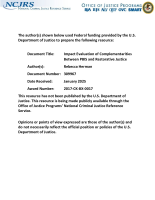Restorative justice
SNPs for Individual Identification
Incapacitated, Forcible, and Drug/Alcohol-Facilitated Rape in Relation to Binge Drinking, Marijuana Use, and Illicit Drug Use: A National Survey
Identification of smartphone-image source and manipulation
A gonosomal marker multiplex to aid in mixture interpretation
GC–MS and IR studies on the six ring regioisomeric dimethoxybenzoyl-N-methylpiperazines (DMBzMPs)
Forcible, Drug-Facilitated, and Incapacitated Rape in Relation to Substance Use Problems: Results from a National Sample of College Women
An efficient clustering-based retrieval framework for real crime scene footwear marks
Application of the scientific method to skeletal biology
Restorative Community Justice: Background, Program Examples, and Research Findings
Restorative Justice: Friend or Foe?
Impact Evaluation of Complementarities Between PBIS and Restorative Justice
Redesigning Life in U.S. Prisons
The prison system in the U.S. typically places a heavy emphasis on security, control, and punishment, and this foundation can create an adversarial culture within correctional facilities — incarcerated individuals versus correctional staff. But what if that culture could change? What would it look like? How would it impact not only incarcerated individuals but also correctional officers and other staff?




